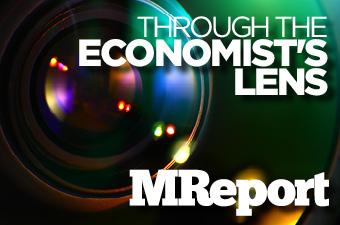So, there's some sort of football game this weekend. Like many economists, I'm a bigger baseball fan than football, intrigued by the statistics in baseball, statistically a zero-sum game unlike most other sports. Just about every positive statistic in baseball for one player has a corresponding negative statistic for another. (The sole exception is an error charged on a foul ball which extends the batter's time at bat, but that doesn't show up in his stats.)
[IMAGE]All that aside, there is some linkage between Super Bowl (yes, that's the name of this Sunday's game) and the economy, not just the stock market as many ""analysts"" like to write. Indeed, the stock market isn't the economy, but that's a whole 'nother discussion.
To be sure, the Super Bowl has an immediate impact on the economy of the city in which it's played--New Orleans this year with New York salivating for the February 2, 2014, contest and the run-up to it, but could it affect the broader economy?
The results of the Super Bowl are pretty much evenly split with 25 wins for the National League or conference ad 21 for the American.
Over the course of those 25 NFL or NFC victories, the average annual GDP growth was 2.6 percent but when the American League or Conference won, the average growth rate was 3.0 percent. That said, over the history of the Super Bowl, dating back to 1967, there have been seven years of negative economic growth, four when the American team was victorious--three times when Pittsburgh won.
The AFC's Baltimore Ravens won the Super Bowl one in 2001 and the economy expanded at a paltry 1.1 percent. San Francisco has won five times--1982, 1985, 1989, 1990, and 1995 and the average GDP growth in those five years was 2.0 percent, including one year--1982--in which GDP was negative for the full year, down 1.9 percent in 1982. The other four years included two strong years for the economy, a 4.1 percent growth rate in 1985 and 3.6 percent in 1989.
(Baltimore's only other Super Bowl appearance was as the Baltimore Colts in 1969, losing a fabled game to the Joe Namath-led New York Jets in a year in which the economy grew 3.1 percent.)
The 49ers have never lost a Super Bowl.
It's not only the winner or loser who could ""affect"" the economy. In the 11 years in which an American conference/league team won by 10 or more points, the economy grew by an average of 2.2 percent.
[COLUMN_BREAK]That included three years of ""negative"" growth, but also the strongest GDP over the game's history, a 7.2 percent growth in 1984 when the L.A. Raiders (since moved to Oakland) beat the Washington Redskins by 29 points, 38-9, the biggest margin for an American conference/league team.
San Francisco recorded the largest margin of victory, 45 points, when it beat the Denver Broncos 55-10 in1990. The economy grew just 1.9 percent that year. But in the 18 years in which the National league/conference team won by 10 or more points, the economy grew by a relatively robust 3.6 percent. In the two years in which the National's New York Giants eked out victories over the New England Patriots by three and one points (2008 and 1991), the economy turned negative, contracting 0.3 percentage points in 2008 and 0.2 percentage points in 1991.
New England had three of the three-point victories recorded by AFL/AFC teams--in 2002, 2004, and 2005, with GDP growing an average of 2.9 points in those years. The other slim three-point AFL/AFC margin belonged to the Baltimore Colts in 1971, when the economy grew 3.4 percent.
NFL/C teams have scored 40 or more points six times--twice scoring more than 50 points, the 49ers in 1990 and the Dallas Cowboys in 1993. In those high scoring years, average growth rate for GDP was 2.9 percent, just below what economists consider ""trend"" growth. The weakest growth in those five years came when San Francisco scored those 55 points in 1990.
The AFL/C team scored 30 or more points eight times, including Baltimore's 34-7 win over the New York Giants in 2001, with its paltry GDP result. Over those eight years, though the average growth in GDP was 3.6 percent, even including the weak Baltimore year and 1980 when the Steelers beat the LA Rams 31-19 and the economy contracted 0.3 percent.
So, is the Super Bowl an indicator? I wouldn't know. As a baseball fan I'll be using the Super Bowl another way: to get into an otherwise crowded restaurant and enjoying a quiet dinner.
So, Baltimore won...and the groundhog, in the northeast at least, didn't see its shadow: each with the same effect.
-0-
The upcoming week will be relatively light in terms of economic news, particularly housing related. The ""Federal Reserve"":http://www.federalreserve.gov/ will release its quarterly Senior Loan Officer Opinion Survey tracking whether banks are tightening or loosening credit standards. The survey provides guidance, if not hard data, since lenders who have tightened standards as much as possible will report no further tightening, which could be misinterpreted as suggesting lenders are beginning to ease.
As to data report, the Federal Reserve will report Thursday on consumer credit outstanding--revolving (credit card) debt and term loans, excluding mortgage debt. For December. Consumer credit outstanding will likely show an increase, particularly in term loans reflecting strong auto sales in December, much of which was the replacement of vehicles destroyed by Superstorm Sandy. Those purchases contributed to the increase in personal consumption spending in both the ""fourth quarter GDP report"":http://www.dsnews.com/articles/gdp-falls-in-4q-first-drop-since-recession-ended-2013-01-30 and the ""December consumption spending report"":http://www.dsnews.com/articles/fiscal-cliff-dividends-send-personal-incomne-skyrocketing-2013-01-31.
_Hear Mark Lieberman on P.O.T.U.S. Radio (SiriusXM 124) Friday at 6:40 a.m. and again at 9:40 a.m. Eastern Time_

 theMReport.com Your trusted source for mortgage banking news
theMReport.com Your trusted source for mortgage banking news









